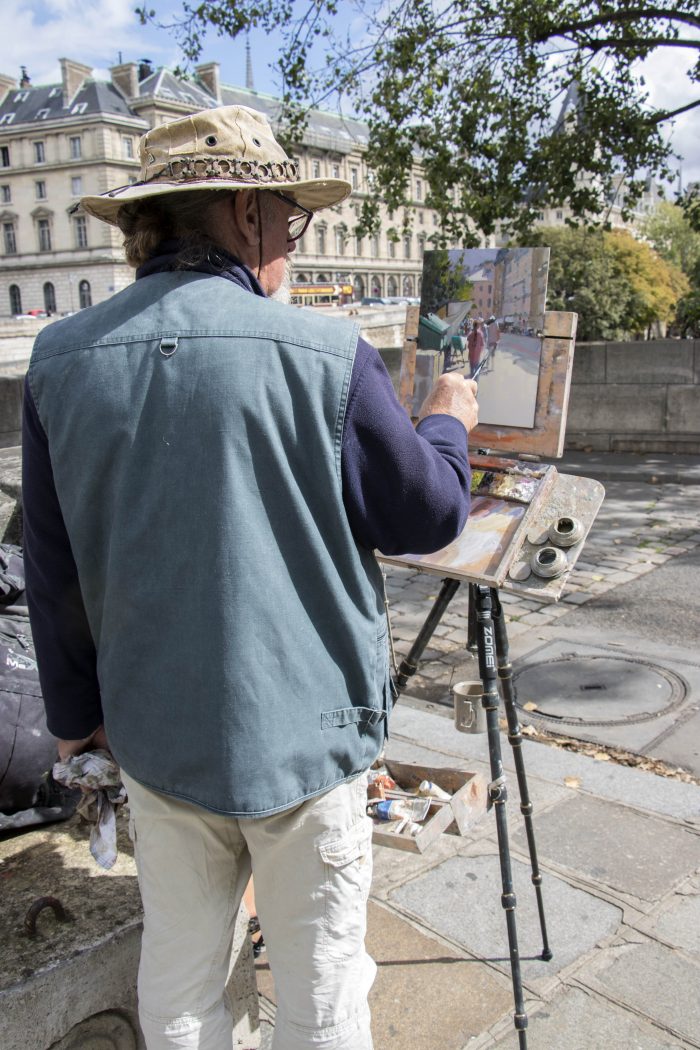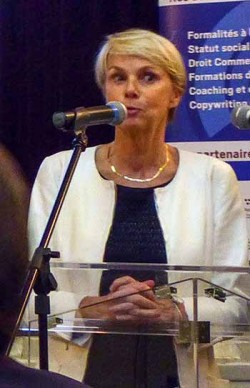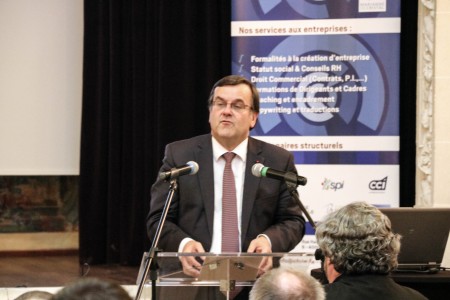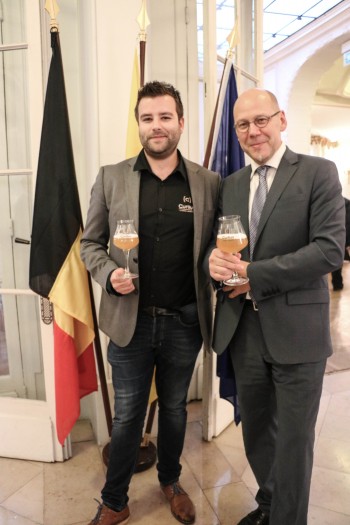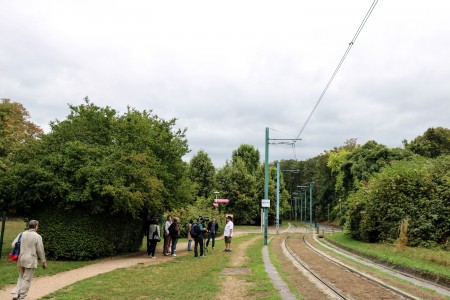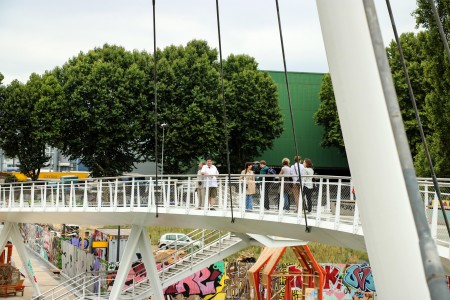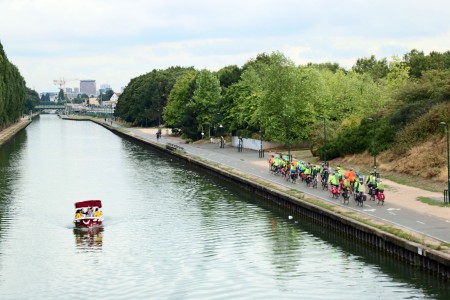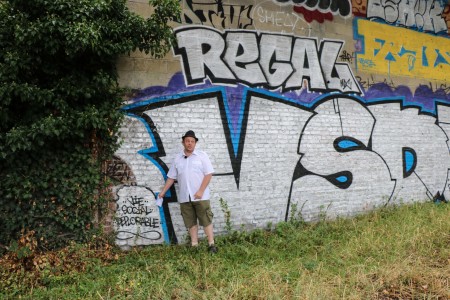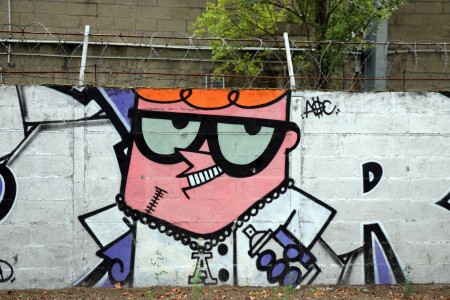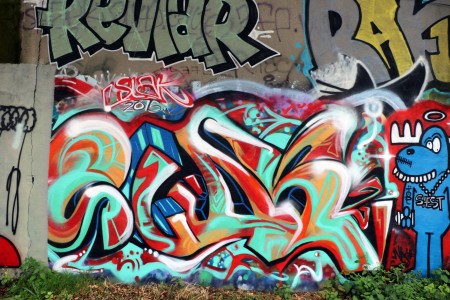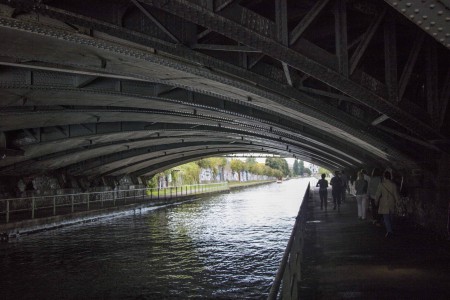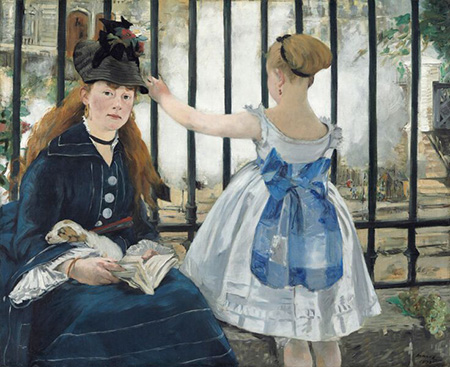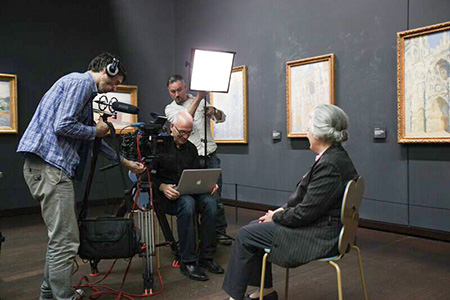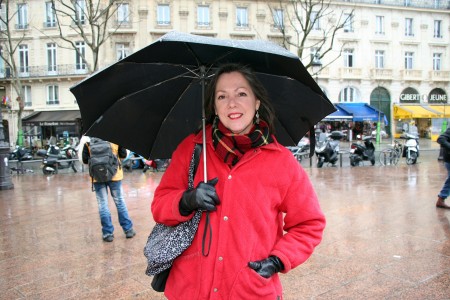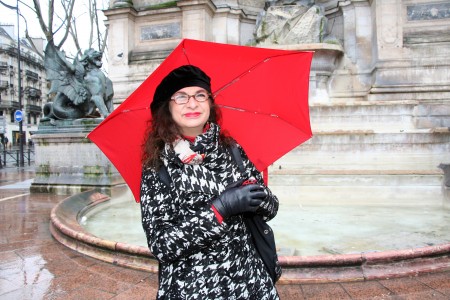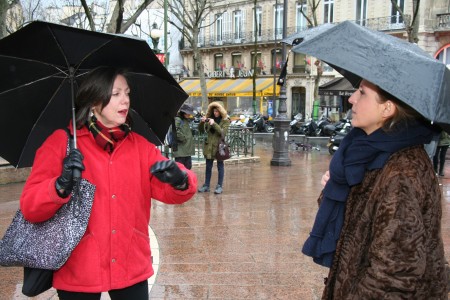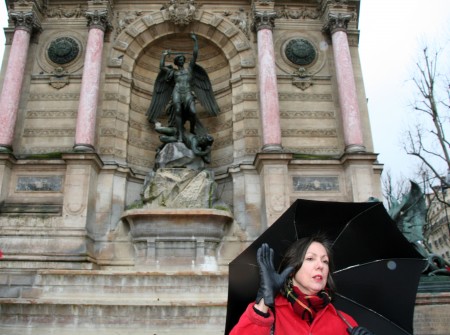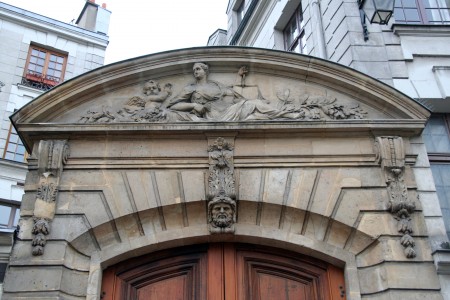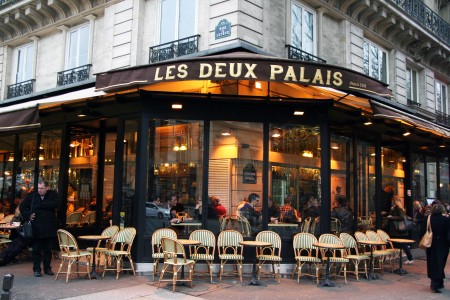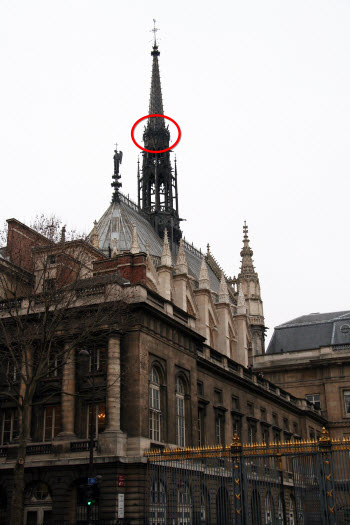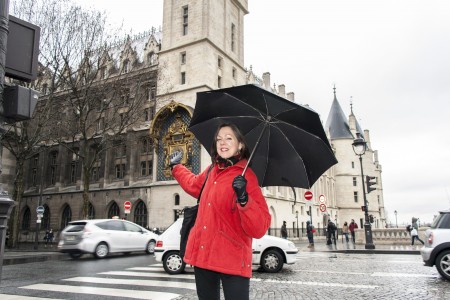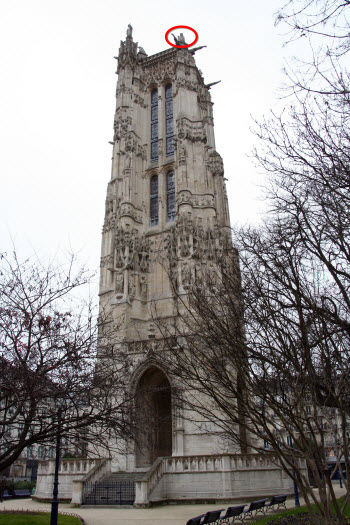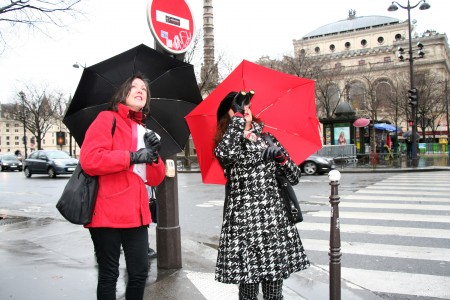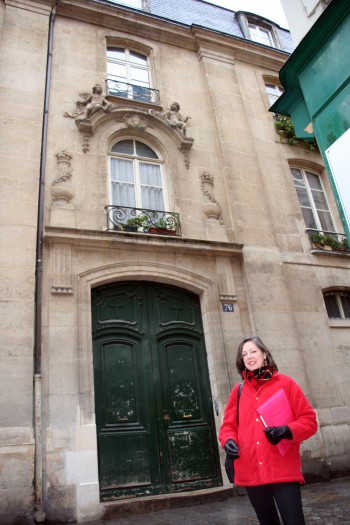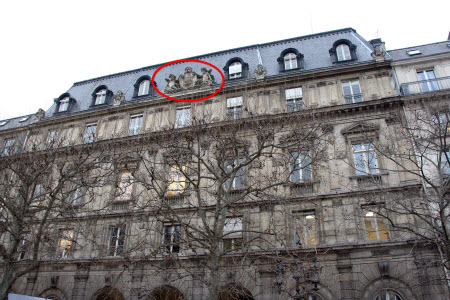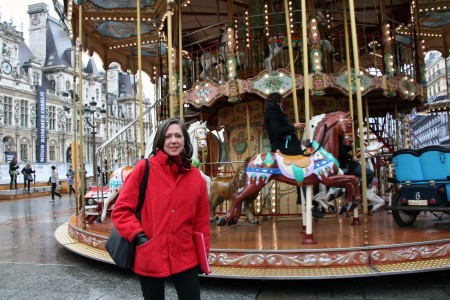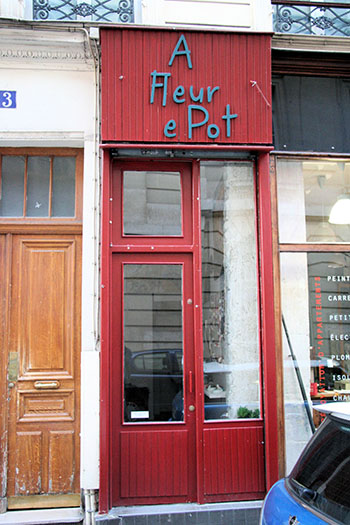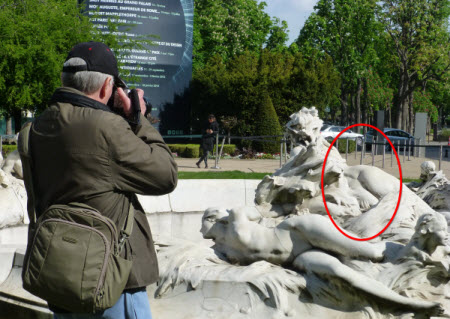An artists paints a city scene at quai de Conti.
Archive for the ‘art’ Category
Paris Is for Artists
Sunday, September 10th, 2017What’s New at Discover Paris! – End-of-Year Edition
Wednesday, December 30th, 2015Discover Paris! has been quite active during this last month of 2015 – things have been so hectic that we just now realized that we’ve neglected to tell you why!
Our own Monique Y. Wells recently founded a non-profit organization called Wells International Foundation (WIF). The foundation’s inaugural project is the Beauford Delaney and Paris exhibition that we mentioned in our last “What’s New” mailing to you. This show brings together three of WIF’s focus areas of activity – the arts, study abroad, and STEAM (science, technology, engineering, arts, and mathematics).
WIF is partnering with a number of organizations, including Les Amis de Beauford Delaney, a French non-profit association that Monique founded in 2009, and Columbia Global Centers | Europe at Reid Hall in Paris to present the exhibition. It will consist of over 40 paintings and works on paper by American artist Beauford Delaney (1901-1979), many of which have never been seen by the general public before. The grand opening is scheduled for February 3, 2016 and the show will run from February 4-29, 2016.
WIF is also collaborating with J Rêve International, an organization that fosters visual and performing arts, creative education, and global exchanges to transform lives and communities. During the exhibition, J Rêve International will host a Global Educator Program workshop on STEAM education and multiple intelligences based on Beauford Delaney’s life and work. Six teachers from New York, South Korea (via Ohio), and Texas will participate in the week-long workshop designed to develop experience that equips them with the global competencies necessary to bring an international arts perspective to their schools.
Additionally, WIF is partnering with the University of Arizona to organize an Augmented Reality Project. Five students, led by Professor Bryan Carter, will come to Paris to create an app (a small, specialized program that is downloaded into mobile devices) that will allow persons attending the exhibition to scan paintings with devices such as smartphones, causing a video to appear on the screen that provides information about the painting. The teachers from the Global Educator Program will be able to use this app during their workshop in Paris and take the technology back to their respective school districts in the U.S. at the end of the program.
Teachers and students will enjoy the newest Entrée to Black Paris walking tour, Beauford Delaney’s Montparnasse, which Monique has created for the exhibition.
The University of Arizona students are currently raising money for their trip to Paris and have created a video that explains why they are so passionate about this project. View their 2’15” video at the link below and make a donation to support them. If you need a last minute tax deduction for 2015, this is a great way to get one!
https://www.crowdrise.com/universityofarizonas
Liège and the Louvre – Partners in Art
Tuesday, September 15th, 2015September 14 was a grand day for France and the city of Liège, Belgium. A series of events unfolded to announce a cultural partnership that will be anchored by a collaboration between La Boverie, Liège’s fine arts museum, and the Louvre museum in Paris.
The last event of the day celebrated the La Boverie-Louvre partnership with a reception and presentation at the Belgian Embassy. Madame Fabienne Reuter, General Delegate of Wallonia-Brussels in Paris, opened the ceremony by recalling her childhood memories of the unique site where La Boverie now stands. She then introduced the first speaker of the evening.
Willy Demeyer, Mayor of Liège in Belgium, took the stage and spoke passionately about La Boverie, which is currently under renovation in Liège.
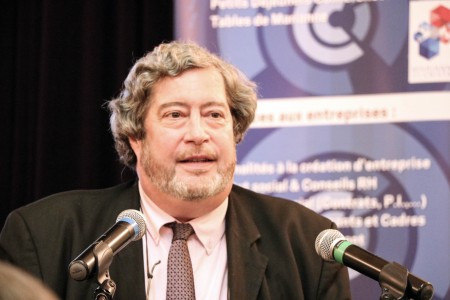
Vincent Pomarède – Director of Cultural Programming at the Louvre
Photograph by www.DiscoverParis.net
He was followed by Vincent Pomarède, Director of Cultural Programming at the Louvre, who shared his enthusiasm for the partnership and spoke about the theme of “In Open Air,” the inaugural exposition to be held at La Boverie in May 2016. The show is still in the planning stage; details will be forthcoming in the near future.
Michel Cloes, Honorary Consul of France for the Provinces of Liège and Luxembourg and organizer of the event, was in attendance. He and François Dethier, Associate Director of Curtius Brewery in Liège, pose next to the Belgium flag, each holding a glass of Curtius beer.
Curtius Brewery was one of the supplies of Belgium products that were served at last night’s reception.
A Sunday Promenade along the Ourcq Canal
Sunday, August 30th, 2015Last Sunday, we joined a walking tour organized by the Seine-Saint-Denis Office of Tourism to learn about the “street art” that lines the walls of the industrial zone of the Ourcq Canal. Led by our guide, Thom-Thom, we wended our way from the Bobigny – Pablo Picasso metro station at the end of line 5 through a park to arrive at the canal.
I was surprised to see how much greenery there is between the metro station and the canal. While we traversed the park, called Parc Départemental de la Bergère, I saw cyclists and joggers. And the people we saw on bicycles weren’t your ordinary Sunday-morning cyclists — they were wearing helmets and cycling shirts and shorts and were mounted on shiny, new velocipedes. The joggers, too, were dressed in sleek athletic wear.
Once we got to the canal, Thom-Thom pointed across the water to indicate the wall along which the art was located. To me, it looked like the dreary graffiti that one sees on retaining walls along the tracks of any inter-city train that runs from Paris. Thom-Thom, however, spoke enthusiastically about it and made the following points:
* the people who paint the images do so as a means of leaving their personal stamp on the urban landscape
* the images are painted on decrepit walls of the industrial zone of the canal
* though the “tagging” is illegal, it is largely tolerated because of the location and because the owners of the tagged property do not file complaints with the local police.
We crossed a pedestrian bridge to reach the other side of the canal and proceeded to walk along the wall. Along the way, Thom-Thom talked about the various techniques that street artists use, essentially cans of spray paint, but also roller brushes and stencils. He also talked about the camaraderie that formed among the artists and how groups (called “crews”) would claim an area as “theirs.”
We passed by junkyard dogs who ferociously barked their disapproval of our presence. Happily, they were confined to their compounds by sturdy fences. I noted that one of the dogs barely opened his eyes and continued to lie lazily on the ground. He seemed content to let his companions do the barking. That’s the kind of work that I would want if I were a junkyard dog!
Thom-Thom explained some of the finer points of street art. He pointed out that a group of artists called VSD (Vie Social Déplorable) painted its logo here. Many artists prefer using the color silver because it shows up better in the dark, especially in train tunnels.
Thom-Thom called this cursive art “Gothic” style.
This lovely lady looked rather menacing.
Thom-Thom shared many insights about “tagger” culture and technique on this stretch of the walk. We then left the industrial zone, passing through a tunnel, to continue our promenade down the canal. We now have a new appreciation of street art, thanks to Thom-Thom and the Seine-Saint-Denis Office of Tourism!
The Impressionists — And the Man Who Made Them
Tuesday, June 23rd, 2015The Impressionists — And the Man Who Made Them is a documentary film about a man who was smitten by a radical new form of painting and his determination to support and promote it. That new form of painting was called Impressionism and the man who supported it was a Parisian art dealer named Paul Durand-Ruel.
When Impressionist painters first began showing their works in the 1870s, they were greeted with derision by the French public and art critics. Up until that time, art was officially supported by the French government, and art that was accepted for display in its annual salons had to meet the standards of the jury of the French Academy of Fine Art. Art produced by graduates of the academy was characterized by its highly polished, finished style. The general public, accustomed to academic art, viewed the new “intransigent” art (later called “impressionism”) as crude and unfinished. People would go to galleries where these paintings were displayed not to ponder over them as works of art, but rather to laugh at them.
Paul Durand-Ruel was acutely aware of the public’s intense negative reaction to Impressionism, but he was determined to invest time, energy, and money in promoting the art and its artists until the paintings achieved the value that he thought they were worth. The process would take twenty years and bring the visionary art dealer close to bankruptcy on several occasions.
The Impressionists — And the Man Who Made Them traces the history of Durand-Ruel’s struggle to make Impressionism acceptable. Phil Grabsky, a British documentary film maker, takes us into the Luxembourg Museum in Paris where an exhibit that treated the same subject was being installed. During the film, we see Durand-Ruel’s great grandson, great-great grand daughter, and other art curators talk about his unstinting support for the new painting and its artists. We are also treated to sumptuous close-up views of a number of the paintings, whose colors and textures appear with stunning exactitude on the wide screen of a movie theater. Enchanting piano music inspired by melodies of the period interweaves throughout the film, transforming it into a compelling story.
The Impressionists will be released in the United States on July 18. And the Luxembourg Museum exhibit that inspired the documentary has already moved to the United States, opening at the Philadelphia Museum of Art on June 24. Entitled “Discovering the Impressionists: Paul Durand-Ruel and the New Painting,” it runs until September 13.
Angels of Paris – A Guided Walking Tour with Rosemary Flannery
Tuesday, February 17th, 2015When Rosemary Flannery invited me to join her for a guided walking tour to see the angels of Paris, I jumped at the chance. Rosemary is an expert on angels, having published a book on the subject.
The rendezvous point was set for place Saint-Michel, a popular square on the river between quai Saint-Michel and quai des Grands Augustins. The day was cold and drizzly, but the rain didn’t come down hard enough to keep me away. Nor did it chase away other people who gathered there for one reason or another. Soon the square was abuzz with different groups milling about.
Rosemary showed up, looking lovely in her red jacket.
Adrian Leeds showed up carrying a red umbrella. No shrinking violet she! A woman who wears many hats, including the beret that she dons for style and for warmth, she is president of The Adrian Leeds Group.
Another person showed up (on the right in the photo above), but she had to dash off soon after. That left us as a group of three, Rosemary, Adrian, and me.
Rosemary talked about Michel, the Archangel who defeated Lucifer in a mighty battle and cast him out of Heaven. Attached to Michel’s back are enormous wings befitting a powerful angel, while Lucifer displays only tiny bat-like wings affixed to his shoulder blades. The sculptural group by Francisque Duret was created to embellish this square, which was built by architect Gabriel Davioud in 1860 during the era of Baron Haussmann’s renovation of Paris.
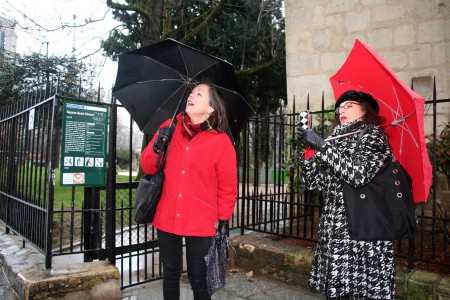
Rosemary and Adrian Admire Angel on the Doorway to the House of Isaac de Laffemans
Photograph by www.DiscoverParis.net
Our next stop was on rue Saint-Julien-le-Pauvre, where we admired the pediment over the entrance to the house of Isaac de Laffemans. One of the most despised public figures of the 17th century, de Laffemans served as the Civil and Criminal Lieutenant of the Provost of Paris, administering “justice” to the enemies of anyone suspected of plotting against Louis XIII. The pediment displays a chubby angel and a lounging woman in a low-cut gown, who swings the scales of justice to and fro, apparently with the same insouciance that de Laffemans had for his victims.
We were feeling chilled, so we stopped for hot chocolate at Les Deux Palais, a café across the street from the Palace of Justice. While we warmed up, Rosemary talked about the angels of the spire of Sainte-Chapelle, a 13th-century gem of a church that stands next to the palace. She explained that there are eight angels, four of which hold instruments of the Passion. They are interspersed with four angel musicians blowing long trumpets.
We left the café and stopped just a block away to admire the Tour de l’Horloge. Constructed in the 14th century at the behest of Charles V, the face of the clock displays a duo of angels bearing the royal shield.
At the corner of avenue de Victoria and boulevard de Sébastopol, we looked up to see the Tower of Saint-Jacques rising high above. Rosemary pointed out an angel who represents Matthew, one of the four evangelists of the New Testament. The tower was built as a bell tower for a church named Église Saint-Jacques-de-la-Boucherie, whose parishioners were the butchers of the central market place that once existed nearby. The church was dismantled during the Revolution, but somehow its tower was preserved. Today it soars gracefully into the Paris sky!
Rue de la Verrerie was our penultimate stop. Rosemary called our attention to two angels sitting on the molding of the façade of the Saint Merry Church presbytery. Merry, a nickname for Medericus, was a 7th century abbot who came to Paris to live as a hermit. Somehow, he got a church named after him. The angel on the left clutches a giant pair of keys in tribute to Peter, gatekeeper of Heaven, while the other holds an abbot’s staff. Between the angels, just below the molding, is a heart, an allusion to Medericus’s heart that was once conserved as a relic here until it disappeared during the Revolution.
From rue de la Verrerie, we walked over to place de l’Hôtel de Ville where Rosemary pointed out a duo of mischievous-looking angels with fetching smiles posed above the sober facade of an administrative building. Between them, the angels present the Seal of Paris: a three-masted galleon floating along the wavy currents of the Seine. A patterned strip of fleur-de-lis decorates the top, while the shield is crowned by a circle of crenelated towers, evoking the medieval ring of fortifications that once surrounded the city.
Rosemary was eager to show us other angels, but we had run out of time. It had been a fascinating morning learning about the angels of Paris!
Rosemary Flannery offers guided tours of Paris. Information about her services can be found at the following link: http://passport-to-paris.com/.
One of the Narrowest Shops in Paris
Saturday, June 21st, 2014This shop, measuring 1.1 meters wide, stands at 3, rue Clotaire in the 5th arrondissement. The sign above the door indicates that it used to be a flower shop, but it is now an art gallery called Galerie Rouleau. But the gallery won’t be at this location much longer, because the proprietor, Ying na Zhao, told me that it will move at the end of June to a larger location.
The gallery exhibits paintings, ceramic jewelery, and photographs from China.
I look forward to visiting the gallery at its new location so that I can step back to admire the paintings!
The Eternal Quest for Beautiful Fesses – Our Fesses of the Month
Tuesday, May 20th, 2014Around the corner from the Champs-Elysées Clémenceau metro station, in the Square Jean-Perrin, stands a large oval fountain designed by sculptor François-Raoul Larche in 1910. Named Miroir d’eau, la Seine et ses affluents, it displays three allegorical groups that represent the tributaries of the Seine. Each group consists of a woman, each accompanied by two children, all evoking nine tributaries: L’Aube, Le Loing, L’Essonne, L’Yonne, L’Armançon, La Cure, L’Oise, La Marne, and Le Petit Morin.
The sculpted marble figures are shown admiring their own reflections in the water, and, at the same time, revealing their magnificent naked buttocks to real-life humans passing by.
Follow the link below for a close-up view:
http://www.pinterest.com/pin/411586853418340623/
Vanina Desanges Exhibits at Artame Gallery
Tuesday, May 13th, 2014Last Saturday I had the occasion to meet an artist on the metro. Her name is Vanina Desanges and she was taking three of her paintings to a gallery where she will be participating in a group exposition with twenty other artists. I was intrigued with her painting, so I asked her if she would pose for a picture. She did, and I braced myself as best as I could against the sway of the speeding train.
The group exhibition will be held from May 15 to June 6 at the Artame Gallery in the Belleville district of the 20th arrondissement.
And, coincidentally, the Journées Portes Ouvertes des Ateliers d’Artistes de Belleville will take place from May 23 to May 26 this year. Visitors who come by the gallery will be invited to participate in a collective effort to decorate a giant layer “cake,” called an artgato. The event sounds as if it will be a lot of fun!.
Artame
37, rue Ramponeau
75020 Paris
Tel.: 01.40.33.42.51
Open Tues to Sat from 2:00 p.m. to 7:00 p.m.
First Known Selfie
Friday, April 18th, 2014A bronze sculpture representing a man posing for a selfie with what appears to be a prototype iPhone stands in the Luxembourg Garden. Cast in 1868, the statue is the earliest representation of what many have, up until now, believed to be a modern phenomenon.

